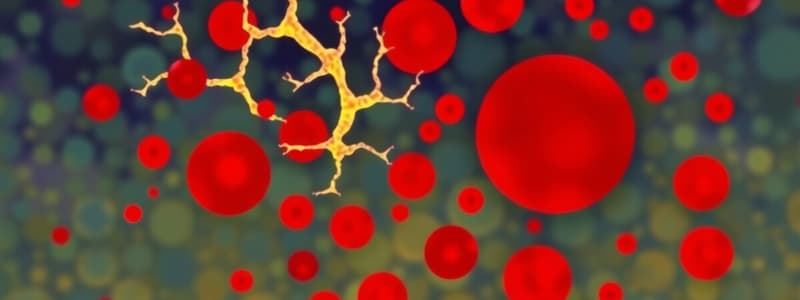Podcast
Questions and Answers
Which protein is primarily responsible for anchoring the band 3 and protein 4.2 in erythrocyte membranes?
Which protein is primarily responsible for anchoring the band 3 and protein 4.2 in erythrocyte membranes?
- α-spectrin
- Adducin
- Protein 4.1
- β-spectrin (correct)
What role does the protein Ankyrin serve in erythrocyte membranes?
What role does the protein Ankyrin serve in erythrocyte membranes?
- Anchors 4.1 complex (correct)
- Transport of urea
- Acts as an integrin
- Caps actin filaments
Which hereditary condition is associated with a deficiency in Ankyrin and results in a decreased surface area-to-volume ratio of erythrocytes?
Which hereditary condition is associated with a deficiency in Ankyrin and results in a decreased surface area-to-volume ratio of erythrocytes?
- Sickle cell disease
- Glycophorin deficiency
- Hereditary spherocytosis (correct)
- Ankyrin deficiency syndrome
Which glycophorin is known to support the determinants of the Gerbich system?
Which glycophorin is known to support the determinants of the Gerbich system?
Which of the following skeletal proteins is primarily responsible for regulating actin polymerization in erythrocytes?
Which of the following skeletal proteins is primarily responsible for regulating actin polymerization in erythrocytes?
What is the inheritance pattern of hereditary spherocytosis?
What is the inheritance pattern of hereditary spherocytosis?
Which glycophorin is responsible for the transport of urea in erythrocytes?
Which glycophorin is responsible for the transport of urea in erythrocytes?
What major effect does hereditary spherocytosis have on MCHC values?
What major effect does hereditary spherocytosis have on MCHC values?
Flashcards
Glycophorin A
Glycophorin A
Transports negative sialic acid and supports cell surface determinants.
Glycophorin B
Glycophorin B
Transports negative sialic acids and maintains cell surface antigens.
α-spectrin
α-spectrin
A key cytoskeletal protein that stabilizes the erythrocyte membrane.
β-spectrin
β-spectrin
Signup and view all the flashcards
Hereditary Spherocytosis
Hereditary Spherocytosis
Signup and view all the flashcards
MCHC
MCHC
Signup and view all the flashcards
Ankyrin
Ankyrin
Signup and view all the flashcards
Band 3
Band 3
Signup and view all the flashcards
Protein 4.2
Protein 4.2
Signup and view all the flashcards
Study Notes
Glycophorins
- Glycophorin A transports negatively charged sialic acid and supports determinants.
- Glycophorin B transports negatively charged sialic acid and supports Ss determinants.
- Glycophorin C transports negatively charged sialic acid, supports Gerbich system determinants, and integrin adhesion.
Skeletal Proteins
- Skeletal proteins provide horizontal or lateral support for the membrane.
- They contribute to the shape and flexibility of erythrocytes.
- Examples include a-spectrin, β-spectrin, adducin, ankyrin, dematin, F-actin, protein 4.1, protein 4.2, tropomodulin, and tropomyosin.
Skeletal Protein Function
- a-spectrin: Primary cytoskeletal protein, forming caps actin filaments.
- β-spectrin: Anchors band 3 and protein 4.2, binds β-spectrin.
- Adducin: Actin bundling protein.
- Ankyrin: Anchors 4.1 complex and anchors ankyrin complex.
- Dematin: Caps actin filament.
- F-actin: Protein.
- Protein 4.1: Anchors 4.1 complex.
- Protein 4.2: Caps actin filament and regulates actin polymerization.
- Tropomodulin: Caps actin filament.
- Tropomyosin: Regulates actin polymerization.
Hereditary RBC Membrane Defects
- Hereditary spherocytosis is an autosomal dominant condition (75%).
- Deficient proteins include ankyrin, band 3, a-spectrin, β-spectrin, and protein 4.2.
- Defects in these proteins disrupt membrane interactions between transmembrane proteins and the underlying cytoskeleton.
- This leads to loss of membrane and a decreased surface area-to-volume ratio.
- Patients with hereditary spherocytosis may have an increased MCHC (mean corpuscular hemoglobin concentration). A normal MCHC range is 31 to 37 g/dL. Hemoglobin values (MCHC) rise above 35-38 g/dL because of spherocytosis.
Studying That Suits You
Use AI to generate personalized quizzes and flashcards to suit your learning preferences.


